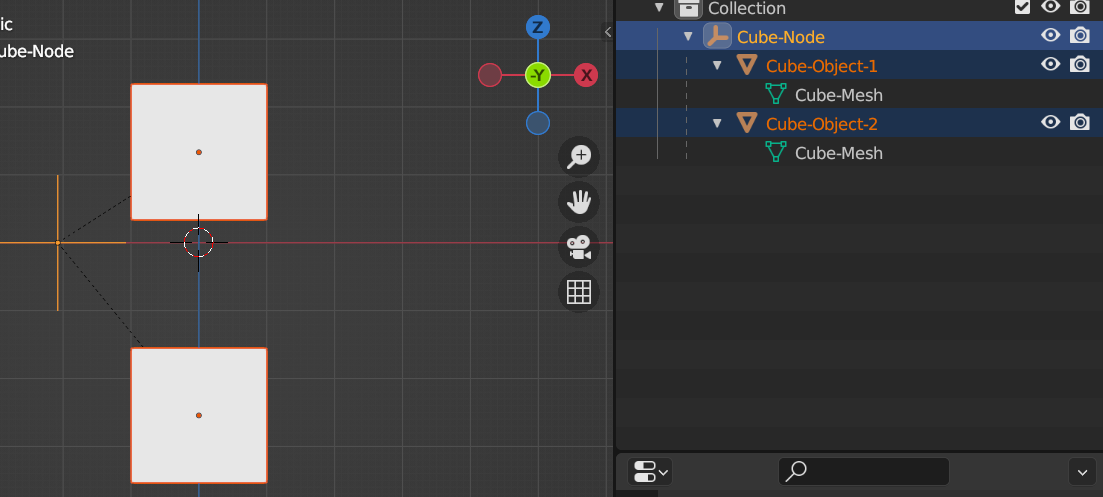Yes, makes sense to me. Would you like to submit a PR?
I made a sample gltf file in Blender, would be nice if you could try it in JME and let us know how the naming looks before and after your change.
Both Cube-Object-1 and Cube-Object-2 share the same mesh.
Here is the gltf file content:
{
"asset" : {
"generator" : "Khronos glTF Blender I/O v3.4.50",
"version" : "2.0"
},
"scene" : 0,
"scenes" : [
{
"name" : "Scene",
"nodes" : [
2
]
}
],
"nodes" : [
{
"mesh" : 0,
"name" : "Cube-Object-1",
"translation" : [
2.0781643390655518,
1.3325393199920654,
0
]
},
{
"mesh" : 0,
"name" : "Cube-Object-2",
"translation" : [
2.0781643390655518,
-2.543614625930786,
0
]
},
{
"children" : [
0,
1
],
"name" : "Cube-Node",
"translation" : [
-2.0781643390655518,
0,
0
]
}
],
"meshes" : [
{
"name" : "Cube-Mesh",
"primitives" : [
{
"attributes" : {
"POSITION" : 0,
"TEXCOORD_0" : 1,
"NORMAL" : 2
},
"indices" : 3
}
]
}
],
"accessors" : [
{
"bufferView" : 0,
"componentType" : 5126,
"count" : 24,
"max" : [
1,
1,
1
],
"min" : [
-1,
-1,
-1
],
"type" : "VEC3"
},
{
"bufferView" : 1,
"componentType" : 5126,
"count" : 24,
"type" : "VEC2"
},
{
"bufferView" : 2,
"componentType" : 5126,
"count" : 24,
"type" : "VEC3"
},
{
"bufferView" : 3,
"componentType" : 5123,
"count" : 36,
"type" : "SCALAR"
}
],
"bufferViews" : [
{
"buffer" : 0,
"byteLength" : 288,
"byteOffset" : 0,
"target" : 34962
},
{
"buffer" : 0,
"byteLength" : 192,
"byteOffset" : 288,
"target" : 34962
},
{
"buffer" : 0,
"byteLength" : 288,
"byteOffset" : 480,
"target" : 34962
},
{
"buffer" : 0,
"byteLength" : 72,
"byteOffset" : 768,
"target" : 34963
}
],
"buffers" : [
{
"byteLength" : 840,
"uri" : "data:application/octet-stream;base64,AACAvwAAgL8AAIA/AACAvwAAgL8AAIA/AACAvwAAgL8AAIA/AACAvwAAgD8AAIA/AACAvwAAgD8AAIA/AACAvwAAgD8AAIA/AACAvwAAgL8AAIC/AACAvwAAgL8AAIC/AACAvwAAgL8AAIC/AACAvwAAgD8AAIC/AACAvwAAgD8AAIC/AACAvwAAgD8AAIC/AACAPwAAgL8AAIA/AACAPwAAgL8AAIA/AACAPwAAgL8AAIA/AACAPwAAgD8AAIA/AACAPwAAgD8AAIA/AACAPwAAgD8AAIA/AACAPwAAgL8AAIC/AACAPwAAgL8AAIC/AACAPwAAgL8AAIC/AACAPwAAgD8AAIC/AACAPwAAgD8AAIC/AACAPwAAgD8AAIC/AAAAPgAAgD4AAMA+AAAAAAAAwD4AAIA/AAAgPwAAAAAAACA/AACAPwAAYD8AAIA+AAAAPgAAAD8AAMA+AABAPwAAwD4AAEA/AAAgPwAAQD8AACA/AABAPwAAYD8AAAA/AADAPgAAgD4AAMA+AACAPgAAwD4AAIA+AAAgPwAAgD4AACA/AACAPgAAID8AAIA+AADAPgAAAD8AAMA+AAAAPwAAwD4AAAA/AAAgPwAAAD8AACA/AAAAPwAAID8AAAA/AAAAAAAAgL8AAACAAAAAAAAAAAAAAIA/AACAvwAAAAAAAACAAAAAAAAAAAAAAIA/AACAvwAAAAAAAACAAAAAAAAAgD8AAACAAAAAAAAAgL8AAACAAACAvwAAAAAAAACAAAAAAAAAAAAAAIC/AACAvwAAAAAAAACAAAAAAAAAAAAAAIC/AAAAAAAAgD8AAACAAAAAAAAAgL8AAACAAAAAAAAAAAAAAIA/AACAPwAAAAAAAACAAAAAAAAAAAAAAIA/AAAAAAAAgD8AAACAAACAPwAAAAAAAACAAAAAAAAAgL8AAACAAAAAAAAAAAAAAIC/AACAPwAAAAAAAACAAAAAAAAAAAAAAIC/AAAAAAAAgD8AAACAAACAPwAAAAAAAACAAgAEAAkAAgAJAAcACAAKABUACAAVABMAFAAXABEAFAARAA4ADQAPAAMADQADAAEABgASAAwABgAMAAAAFgALAAUAFgAFABAA"
}
]
}
